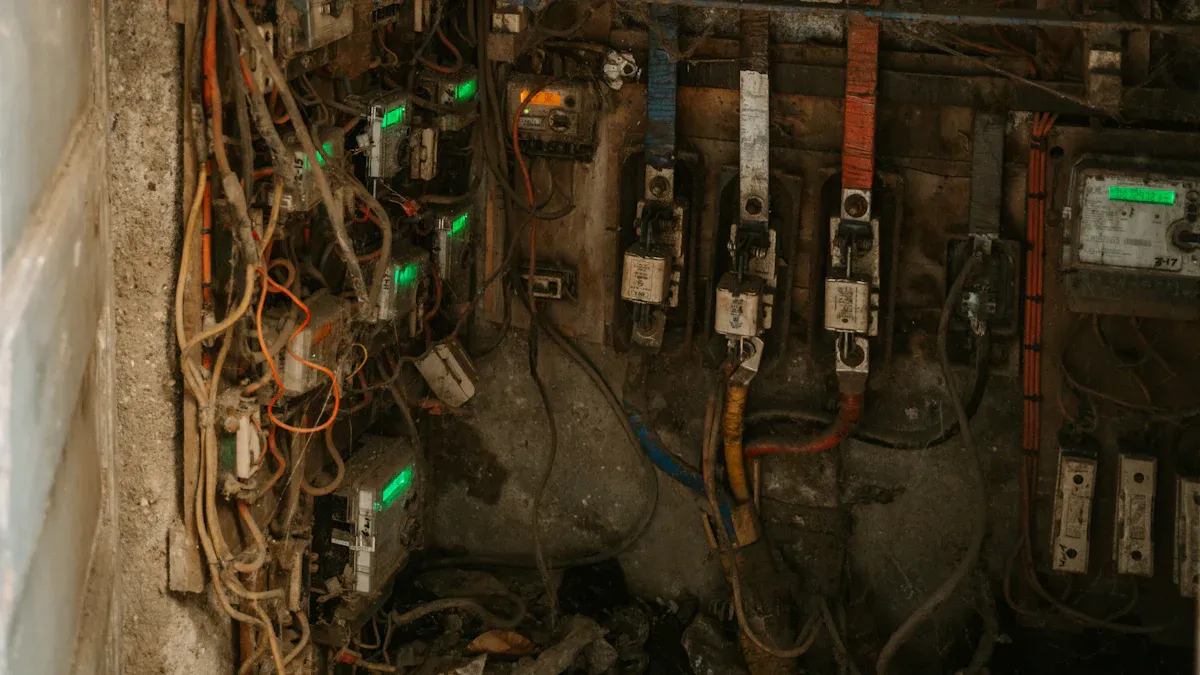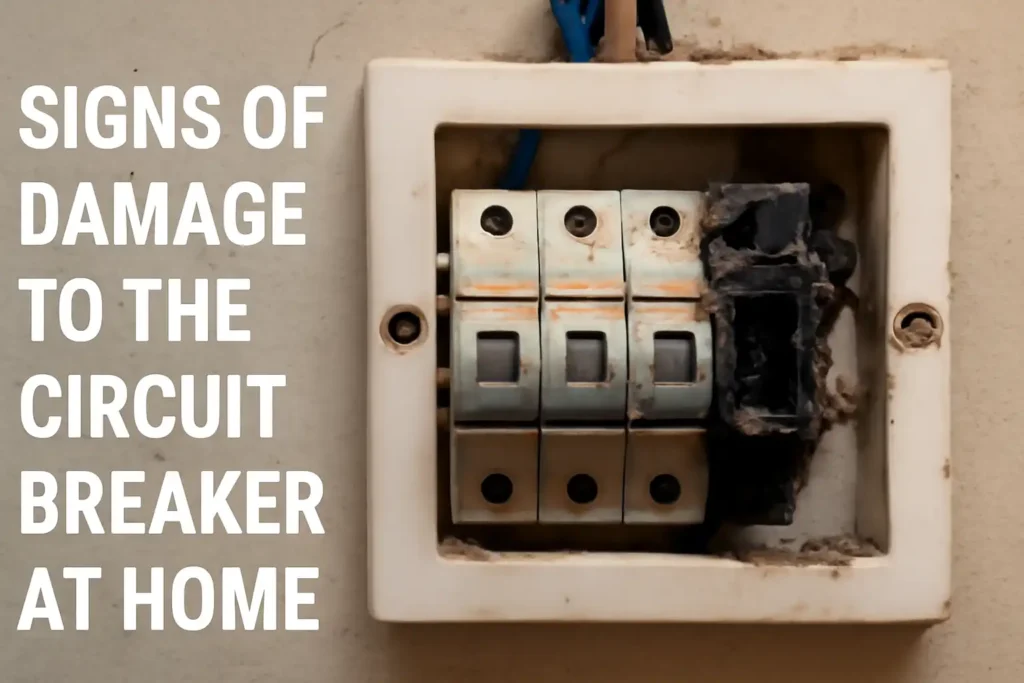You can find signs of damage to the circuit breaker at home. Look for frequent tripping, a burning smell, heat when you touch it, visible damage, buzzing sounds, flickering lights, power changes, or if the breaker is old. Early detection is important because circuit breakers can stop working. For example, Delta Wye Electric says failure rates go from 2% in the first 15 years to 12% after 25 years.
Studies show some brands of breakers may not trip, even with dangerous currents, and hidden problems can cause serious risks like fire or power loss.
It is easy to spot these warning signs. Always take any strange sign seriously to keep your home safe.
Key Takeaways
- If your circuit breaker trips a lot, smells burnt, feels hot, looks broken, makes buzzing sounds, has flickering lights, or changes power, it might be damaged.
- A damaged breaker can cause big problems like fires, broken appliances, and power loss, so finding issues early keeps your home safe.
- Old breakers may not protect your home well; changing them on time lowers the chance of fire and electrical trouble.
- Do not try to fix breaker problems by yourself; always call a licensed electrician to repair it safely and the right way.
- Acting fast when you see warning signs stops accidents and expensive damage, keeping your family and home safe.
Signs of damage to the circuit breaker at home

Frequent Tripping
Sometimes, your circuit breaker trips a lot, even with normal use. This is a common sign that something is wrong with the circuit breaker at home. When it trips, it means there is a problem like too much power, a short, or a ground fault. If you reset it and it trips again, there is a bigger problem.
- Tripping often can mean too many things plugged in, bad wiring, or an old breaker.
- If the breaker will not stay on, there is a constant problem or the breaker is broken.
Do not ignore this. Tripping a lot means your system is not safe and could get too hot or start a fire.
Burning Smell
If you smell something burning near your electrical panel, it is very serious. The smell is like burning plastic or wires. This means something inside is getting too hot.
If you notice this smell, turn off the main power and call an expert right away.
Burning smells can come from loose wires, old insulation, or broken parts. These problems can make the breaker melt and raise the chance of fire. A burning smell is one of the most dangerous signs of damage to the circuit breaker at home.
Hot to the Touch
If you touch the breaker or panel and it feels hot, that is not normal. Breakers should be cool when working right.
- If it feels warm or hot, too much power is moving or wires are loose.
- Studies show overheating is a big problem for circuit breakers.
Heat can hurt the breaker and wires, making your home unsafe. Always check for heat if you think there is a problem.
Visible Damage
Look at your breaker and panel closely. Visible damage is easy to see and is a clear sign of damage to the circuit breaker at home.
- Burn marks, brown or black spots, or yellow stains mean heat damage.
- Melted or bent plastic means the breaker got too hot.
- Cracked or stiff wire covers mean heat hurt the insulation.
- Rust or green spots on connections can cause more heat and trouble.
If you see these things, your breaker might not work right and may not protect your home.
Buzzing or Crackling
Listen for strange sounds from your breaker panel.
- Buzzing or humming can mean sparks or shaking parts inside.
- Crackling sounds can come from loose wires or bad insulation.
- Grinding noises may mean parts are worn out or broken.
These sounds mean something is wrong inside. Sparks and loose wires can start fires or break things. If you hear buzzing or crackling, get your system checked fast.
Flickering Lights
You might see your lights flicker or get dim for no reason. This can happen if a circuit breaker is damaged or not working right. Flickering lights mean the power is not steady.
- Loose wires, too many things plugged in, or a bad breaker can cause this.
- Flickering lights are not just annoying; they show your power is not stable.
If you see this, find out why. Unsteady power can break your electronics and raise fire risk.
Power Fluctuations
Power going up and down is another sign of damage to the circuit breaker at home. You may see your appliances lose power or restart by themselves.
- Breakers that trip a lot, power spikes, or drops can mean a bad breaker.
- Bad load control, poor wiring, or weak grounding can cause these problems.
- Power changes can make your appliances wear out faster and make your home less safe.
Regular checks and new tools can help stop these problems.
Old or Worn Breaker
How old your breaker is matters. Breakers over 10-15 years old are more likely to break.
- Old breakers may not trip when needed, which can cause fires.
- Some old brands, like Federal Pacific Electric Stab-Lok, have caused many fires because they did not work right.
- Old breakers often look worn, rusty, or feel loose when you touch them.
If your breaker is old or has not been checked in years, think about getting a new one. Checking and replacing breakers on time keeps your home safer.
Tip: Always look for these signs of damage to the circuit breaker at home. Acting early keeps your home and family safe.
Why Circuit Breaker Damage Is Dangerous
Fire Risk
Ignoring damage to your circuit breaker is very risky. A broken breaker can make wires get too hot. Hot wires might start a fire inside your walls. Federal Pacific Electric (FPE) panels are in many homes. These panels often do not work right. About one out of four of these breakers does not trip when needed. This can cause too much electricity to flow. Experts say these panels cause 2-3% of house fires in the U.S. The Whisker Labs report and NFPA data show hidden problems can start fires. Loose wires or broken breakers are hard to see. You may not notice these dangers until it is too late.
Note: Even a small sign of damage can be a big risk for your home and family.
Appliance Damage
Broken circuit breakers cannot protect your electronics or appliances. If a breaker fails, it cannot stop power surges or short circuits. Your TV, computer, and fridge may get too much power. This extra power can break them or make them wear out faster. You might see your appliances turn off by themselves or act strange. Replacing broken electronics can cost a lot. Keeping your circuit breaker safe helps you avoid losing money.
Silent Failure
Sometimes, a circuit breaker stops working with no clear signs. You may not hear buzzing or see burn marks. The breaker can look fine but not trip during trouble. This silent failure leaves your home at risk. You could have a fire or shock and not know it.
- Always check your breaker for age and signs of wear.
- Do not wait for big problems before you act.
If you ignore circuit breaker damage, you put your home and safety in danger. Regular checks and quick fixes help keep you safe.
What to Do If You Notice Signs
Safety First
Your safety comes first when you spot any warning signs from your circuit breaker. You should never try to fix electrical problems unless you have the right training. Handling damaged breakers can lead to shocks, burns, or even fires. Industry guidelines stress that only trained professionals should perform repairs or testing. If you notice burning smells, buzzing sounds, or see sparks, you must act quickly to protect yourself and your family.
Tip: If you see smoke, fire, or smell gas, leave your home right away and call emergency services. Never use water on electrical fires.
You can take these immediate steps to stay safe:
- Find the breaker that looks or feels different from the others.
- Switch it fully to the ‘off’ position, then try to reset it once.
- If it trips again, stop resetting it. This shows a deeper problem.
- Avoid touching any damaged parts or wires.
- Keep children and pets away from the panel.
When to Call a Professional
You should call a licensed electrician if you notice any of these problems:
| Red Flags That Need a Professional | Why It Matters |
|---|---|
| Breaker trips often or will not reset | Shows a serious fault |
| Burning smells or visible sparks | High fire risk |
| Flickering or dimming lights | Possible wiring issue |
| Physical damage or water near panel | Danger of shock or fire |
| Unsure about what to do | Safety comes first |
Insurance companies often do not cover damage from DIY electrical work. Trying to fix these problems yourself can lead to bigger risks and higher costs. Certified electricians have the tools and training to find and fix the real cause.
Temporary Precautions
While you wait for help, you can take steps to reduce danger:
- Turn off power to the affected area using the breaker switch.
- Make sure your hands are dry before touching any switches.
- Do not use outlets or appliances on the faulty circuit.
- Prepare a list or take photos of the warning signs for the electrician.
- Teach everyone in your home how to stay safe around the panel.
These actions help prevent fires, shocks, and further damage. Acting quickly and carefully keeps your home and family safe until a professional arrives.
You should look out for signs of damage to the circuit breaker at home. These signs include frequent tripping, burning smells, or things that look broken. Acting fast helps keep your family safe and your home protected. Many electrical accidents can be stopped before they happen. The table below explains why you should always pay attention to warning signs:
| Statistic Description | Data |
|---|---|
| Annual home electrocutions | ~400 people |
| Fires from broken electrical equipment | ~140,000 fires |
| Deaths from these fires annually | ~400 deaths |
Checking your circuit breaker often and calling an expert when you see problems can save lives and help you avoid expensive repairs.
FAQ
Why does my circuit breaker keep tripping?
You see your breaker trip often because it protects your home from too much electricity. This happens when you plug in too many things or when wires have problems. The breaker trips to stop fires or damage.
Why should I replace an old circuit breaker?
Old breakers may not work well. They might not trip when needed. This can let too much electricity flow and cause fires. You keep your home safer when you replace old breakers.
Why is a burning smell from the panel dangerous?
A burning smell means wires or parts get too hot. This can start a fire inside your walls. You must act fast if you smell burning near your breaker panel.
Why do flickering lights mean trouble with my breaker?
Flickering lights show your power is not steady. This can happen when your breaker or wiring has problems. You risk damage to your electronics and higher fire danger if you ignore this sign.
Why should I call a professional for breaker issues?
Electricians know how to fix breakers safely. You risk shock or fire if you try to repair them yourself. Professionals find the real problem and protect your home.
The following information may be of interest to you
Can a circuit breaker cause lights to flicker
Why a circuit breaker makes a buzzing sound
Why a bad circuit breaker can cause low voltage
What Are the Signs of a Bad Circuit Breaker
What are the warning signs of surge protector failure



